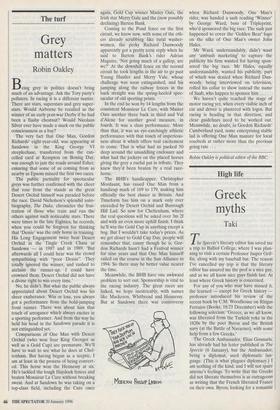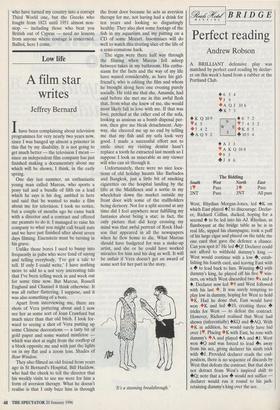High life
Greek myths
Taki
he Speccie's literary editor has saved me a trip to Balliol College, where I was plan- ning to visit a certain Professor Jasper Grif- fin, along with my baseball bat. The reason I've cancelled my trip is that the literary editor has assured me the prof is a nice guy, and as we all know nice guys finish last. At least where Greek history is concerned.
For any of you who may have missed it, the learned — except for Greek history professor introduced his review of the recent book by C.M. Woodhouse on Rhigas Ferraios (Books, 16/23 December) with the following solecism: 'Greece, as we all know, was liberated from the Turkish yoke in the 1820s by the poet Byron and the British navy (at the Battle of Navarino), with some help from a few Greeks.'
The Greek Ambassador, Elias Gounaris, has already had his letter published in The Speccie (6 January), but the Ambassador, being a diplomat, used diplomatic lan- guage. (This is what plagues diplomacy.) I am nothing of the kind, and I will not spare anyone's feelings. To write that the Greeks did not liberate themselves is as outrageous as writing that the French liberated France on their own. Byron, looking for a romantic end, more or less sacrificed himself for Greek independence, but, to paraphrase Uncle Joe Stalin when he was warned that the Vatican was against him, 'how many divisions did the poet have?'
In fact, the more I think of it, the more I want to visit Balliol. It is the biggest false- hood I've read since Walter Duranty wrote in the New York Times that there was no famine in the Ukraine back in the Thirties. My father's ancestors were members of the Philiki Etaireia, the group that financed and organised the War of Independence, and God knows I've been taught from the start how reluctant the Great Powers were to see Greece free.
My mother was named Mando, after a Greek heroine, and our shipping office is situated in Bouboulina's Street, named after the widow of a rich shipowner from Spetsai, who financed the celebrated ship Agamemnon, along with three smaller ves- sels, and who led jointly with her two sons several successful naval battles against Johnny Turk. (She died broke, unlike Andreas Papandreou.) And hasn't the prof ever heard of Admi- rals Miaoulis and Kanaris, the latter being the one who set fire to the Turkish fleet lying off Chios in 1822? What about the great Kolokotronis, the Mavrokoradatos brothers, Athanassios Diakos? Perhaps they do not teach about those great fighters at Balliol, just like Italians are not taught about King George II, John Metaxas and Alexander Papagos, the three men who humiliated the Italians in Albania in 1940.
Needless to say, this is not the first time somebody has tried to pull a fast one right here on The Speccie's pages. Not long ago, a reader wrote in claiming that the poor lit- tle Greek boy was exaggerating the Greek army's brilliant defence against the com- bined powers of the Axis. I did not respond because everyone has the right to get it totally wrong. But now I have the opportu- nity and I will. The Italian army was very well equipped and ten times the strength of our army. We had no air cover and our weapons were considered modern only by the Ancient Spartans, c'est tout. Most sol- diers on the front line were issued with seven bullets daily and ordered to use bay- onets at all times in order to save ammo. We had mules for transport. Still, we kicked the hell out of them and were the first to put up an honourable show against the Germans. And let's not forget Crete, and how the Cretans fought against the German paratroopers. Although the Greeks are not known to honour their benefactors, we do have a street named after Codrington in Athens. The Battle of Navarino sealed the fact that the Greeks had won their independence against the mighty Turks. That is all. And Codrington was recalled for `exceeding his orders'. So, let us have no more bull—t from English profs. If he wants to rewrite history, let him turn General Arthur Perci- val into a hero. I may loathe the crooks who have turned my country into a corrupt Third World one, but the Greeks who fought from 1821 until 1951 almost non- stop — including those who beat you British out of Cyprus — need no lessons from anyone where courage is concerned. Balliol, here I come.




























































 Previous page
Previous page